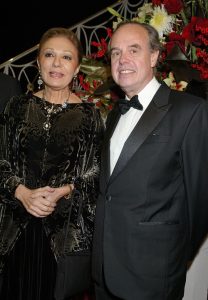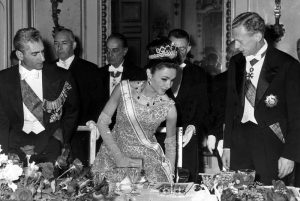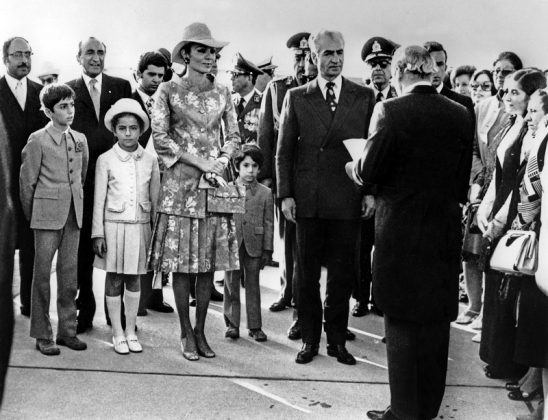By Firouzeh Nabavi
“Farah” is the title of the last book ever published by Frédéric Mitterrand, a onetime Culture Minister of France and a nephew of President François Mitterrand, who passed away on March 21. It is an illustrated book on Empress Farah Pahlavi, whom the author describes as “one of the most remarkable personalities of our time.”
#Farah par Frédéric Mitterrand
Un livre magistralement illustré avec un retour remarquable sur la vie de l'impératrice d'Iran Farah Pahlavi.
Notre pensée à Frédéric Mitterrand, l’homme de culture et ancien ministre qui est parti avant la parution de ce livre#پاینده_ایران pic.twitter.com/gV0ktI7uSA— Azadeh Thiriez (@ATHphilosophia) June 8, 2024
Prefaced and edited by Mitterrand, the book consists of photographs of the Empress, including unseen images, coupled with texts by Mitterrand and handwritten remarks by the Empress herself.
Sa Majesté l’impératrice Farah remet à Frédéric Mitterrand son épée d'académicien @ShahbanouFarah @AcadBeauxarts pic.twitter.com/8s6ylovUGv
— Point de Vue (@PointDeVueMag) February 7, 2020
Mitterrand dedicates the book to “Her Majesty Empress of Iran, Farah Pahlavi. I hope she’ll forgive me for sometimes calling her Farah, out of a sense of loyalty and tenderness…”

“Farah Pahlavi is still in Iran,” he writes in the preface, “even though she left Tehran with her husband the Shah on January 7, 1979. For more than 40 years, she has been constantly thinking about her country, examining its history during the 30 glorious years [1950s-70s] and its breakdown, which has left her heartbroken. These thoughts never leave her.”
The 200-page hardback is organized in 14 chapters, and features images of the Shah and Empress Farah’s childhood and adolescence; their engagement and marriage; her role as queen; their children; her social work; their official trips abroad; the coronation; a few holidays; Persepolis; her cultural work; her private life; their exile and the death of the Shah; her children and grandchildren; and her refuge in Taroudant, in southwestern Morocco.
Mitterrand served as France’s Minister of Culture from 2009 to 2012. A high-profile and sometimes controversial figure, he was a renowned intellectual and TV presenter, cultural commentator, documentary filmmaker, and arthouse cinema proprietor. Like Empress Farah, he was a member of France’s prestigious Académie des Beaux Arts.
On the dedication page, Farah Pahlavi writes: “In memory of all of those who gave their lives for Iran.”
Elsewhere in the book, Mitterrand recalls: “A young student at the Beaux-Arts in Paris, Farah Diba became the wife of the Shah of Iran at the age of 21 in December 1959. The mother of four children, she shared the high points and the vicissitudes of Mohammad Reza’s reign.”
Mitterrand notes that the Empress carried out significant social and cultural activities alongside her husband, and represented him on numerous official trips abroad.

“As a result of her actions,” writes Mitterrand, “she was crowned by the Shah in 1967: the first wife of a sovereign in a Muslim country – evidence, before the eyes of the world, of remarkable progress in women’s rights.”
Following the 1979 Iranian revolution and the death of the Shah, and despite the dramatic death of two of her children as well as the rigors of exile, Farah Pahlavi “tirelessly defends her husband’s memory and his reign and maintains a constant presence with her son Reza,” writes Mitterrand.
The Empress maintains close contact with many of her fellow countrymen, who have a wide range of opinions, and keeps abreast of everything that is happening in her homeland, he adds.
Since the death of the Shah, the author writes, “the cruelest sorrows have not spared the heart of a mother stricken by the death of her children, Leila and Ali Reza – traumatized by the revolution and the hate campaigns wounding their memories and feelings.”
“Yet her exile is not that of a lonely empress. Her son, her family, her close friends and many of her loyal followers are with her to share her memories and hopes. She remains at the forefront, tireless in the fight led by Iranian women heinously persecuted by the Islamic Republic.”
Mitterrand concludes that in the wake of the death of Mahsa Amini, “she sets the example of a life dedicated to defending the cause of women. This album tells the story of a commitment that goes back to childhood and has never wavered.”
In her closing remarks, Empress Farah Pahlavi writes that she never ceases to think of Iran. She ends the book with the following poem by the legendary 14th-century Persian poet, Hafez:
“If you must cross the desert to reach your goal, do so; worry not about wounds and thorns.”
Prince Reza Pahlavi : ‘The Alternative to the Islamic Republic is the Iranian nation’















